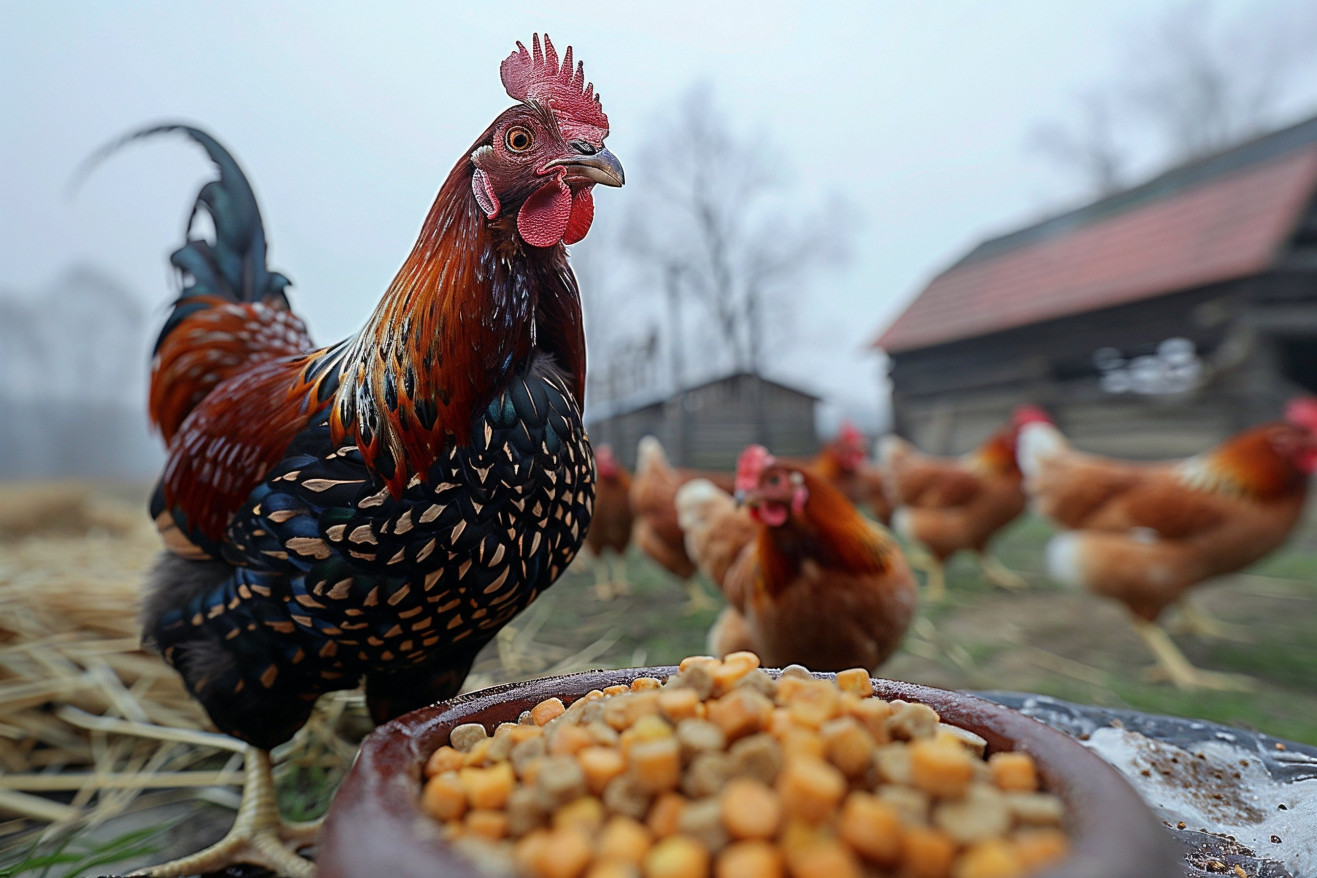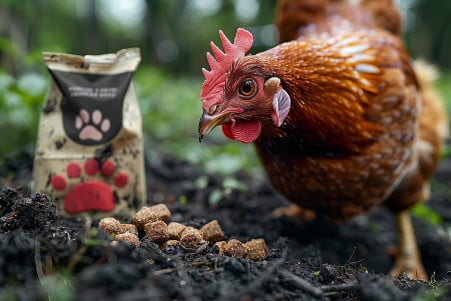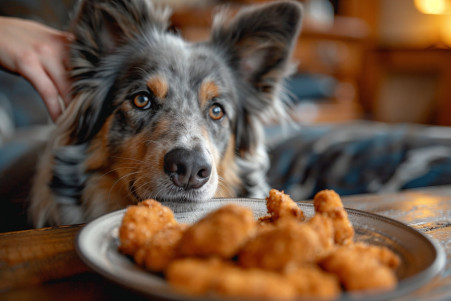Can Chickens Eat Dog Food? Understanding Poultry Nutrition
27 February 2024 • Updated 26 February 2024

Can chickens have dog food as a snack? While chickens can occasionally peck at dog food as a treat, it should not replace their regular diet. Chickens need essential nutrients that dog food doesn’t provide, which can lead to health problems.
It is important to make sure that you are feeding your chickens specially formulated chicken feed.
In the following sections, we will explore this topic in more detail, using information from veterinarians, poultry nutrition standards, and animal welfare research. We will look at the nutritional content of dog food and chicken feed, the dietary needs of chickens, and the potential consequences of not feeding animals according to their dietary needs.
We aim to provide a thorough understanding of why chicken feed is the best option for keeping your flock of birds healthy and productive.
Can chickens eat dog food?
Decoding Dog Food: Ingredients and Nutritional Profiles
Dog food is designed to meet the omnivorous dietary preferences and nutritional needs of dogs.
According to Purina, good dog food is high in protein, which can come from animal sources like meat, poultry, and fish, or plant sources like soybean meal, and typically contains between 18–30% protein.
It also contains fats to support skin and coat health, carbohydrates for energy, and essential vitamins and minerals. The Pet Food Institute notes that it’s important for dog food to be complete and balanced, meaning it meets the nutritional standards set by the Association of American Feed Control Officials, so that each serving meets a dog’s overall nutritional needs and is tailored to their specific life stage.
On the other hand, chickens have different nutritional needs that aren’t necessarily met by the nutritional profile of dog food. For example, some of the vitamins and amino acids that are essential for chickens may be present in dog food but in different amounts or not at all.
In addition, as UK Pet Food explains, while ingredients like cereals and fish can provide energy and essential fatty acids, they may not be in the exact ratios needed to support the best health in poultry.
The idea that one type of pet food can be used to feed all animals doesn’t take into account the very different nutritional needs of different species. As we explore the specific nutritional needs of chickens, it will become clear that while dog food can provide some nutrients that are good for dogs, it doesn’t provide everything that chickens need to stay healthy.
How to Create a Well-Balanced Diet for Chickens: Nutritional Requirements
Chickens need a well-balanced diet that is tailored to their unique nutritional needs, which are very different from those of dogs. According to the University of Georgia Extension, a chicken’s diet should be balanced and provide energy from carbohydrates, which are found in grains, as well as protein, which is needed for tissue repair and growth.
This diet should also include essential amino acids, such as methionine and lysine, which chickens can’t produce on their own.
The Merck Veterinary Manual lists a nutrient profile that shows that chickens need at least 38 nutrients, including important vitamins and minerals. For example, calcium and available phosphorus are important for bone health, and sodium needs to be controlled to avoid too much water intake and wet litter.
According to research by Jeffrey D. Firman and published by MU Extension, commercial chicken feed is formulated to meet these needs with great precision, including the exact ratios that are needed to ensure the best health and productivity.
While dog food is nutritionally complete for dogs, it doesn’t have the right balance of nutrients for chickens and may be missing important nutrients or have them in the wrong amounts. This can lead to a number of health problems for chickens, which we’ll explore in the next section as we look at the impacts of not meeting these important nutritional requirements.
Risk Factors: What Happens When Chickens Eat Dog Food
While feeding chickens dog food can keep them from feeling hungry, it does not provide the nutrition that chickens need, which can lead to serious health problems. Veterinary information from the MSD Veterinary Manual explains that vitamin deficiencies in chickens can occur when their diet does not contain the nutrients they need.
For example, a lack of vitamin A can cause a chicken to have a weakened immune system, poor growth, and vision problems, and a deficiency in vitamin D3 can cause rickets or osteoporosis, which can impact a chicken’s bone health and the quality of their eggshells.
In addition to vitamin deficiencies, The Merck Veterinary Manual explains that metabolic disorders can occur when chickens are fed an inadequate diet, and this can make it difficult to diagnose problems because chickens can store nutrients in their bodies, which can make it hard to determine what they are lacking. A diet like dog food, which is not designed for chickens, can lead to malnutrition and make chickens more susceptible to diseases.
It is important to make sure that chickens are fed a species-appropriate diet that includes the nutrients that they need, including dietary fiber.
A study in the Journal of Animal Science and Biotechnology explains that dietary fiber is important for maintaining gut health and ensuring that nutrients are absorbed.
To avoid the problems that can come with an inadequate diet, it is important to make sure that chickens are fed a balanced diet that meets their nutritional needs, including dietary fiber. This requires a good understanding of the nutritional needs of chickens and a willingness to make sure that they are met.
Feeding Your Flock: How to Feed Chickens
One of the most important ways to make sure your chickens are healthy is to make sure they have a well-rounded diet. When buying chicken feed, make sure to buy feed that is labeled as “complete,” which means that it has been specifically formulated for your poultry’s needs, including age and purpose, according to Longbourn Farm.
A well-rounded chicken diet includes grains, greens, and a source of calcium, like crushed oyster shells, which is especially important for laying hens.
The Hen’s Loft recommends that you feed your chickens treats other than dog food, such as fruits, vegetables, and grains, in moderation to supplement their regular diet. While the occasional addition of high-quality dog food can be a good source of protein, it’s important to make sure that it doesn’t become a regular part of their diet.
Make sure that your chickens always have access to fresh, clean water in addition to their regular feed. Also, make sure to check in with your flock regularly to make sure that they aren’t showing any signs of nutritional deficiencies, like changes in egg production or the quality of their feathers.
This way, you can catch any dietary issues early. By making sure that your chickens have a well-rounded diet, access to clean water, and regular check-ins, you can make sure that your chickens are set up for long-term success.
The Takeaway: Can Chickens Consume Dog Food?
So, yes, chickens may eat dog food out of curiosity, but their nutritional requirements are too different for it to be safe or healthy in the long run. The bottom line is that species-appropriate nutrition matters. Dog food is formulated to meet the dietary needs of dogs, so it’s missing several nutrients chickens require and has others in ratios that are dangerous for them.
The dangers of feeding chickens dog food are real. Nutritional imbalances can cause everything from stunted growth and reduced egg laying to severe vitamin deficiencies and skeletal issues. Properly balancing a bird’s diet is key to ensuring they live a long, healthy, and productive life.
Feeding a flock properly is all about responsible nutrition. We recommend that chicken owners continue to make sure their birds have access to a balanced, chicken-appropriate diet and fresh water and that they work with a vet to get a nutrition plan that’s tailored to their birds. An educated approach to feeding is about more than just making sure your birds are fed; it’s about creating an environment where they can thrive.


